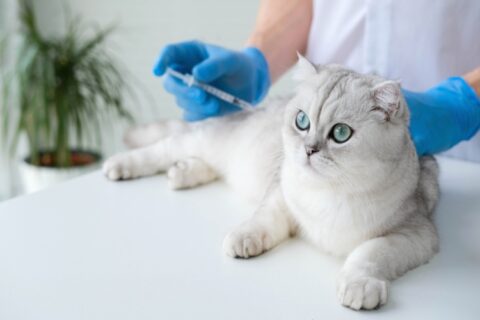How to Help Cats with Hairballs

As pet owners, we get used to cleaning up messes. Cleaning up hairballs, however, doesn’t need to be a regular occurrence. With some simple remedies, you can help your cat’s digestion and save yourself from an unpleasant task.
Hairballs are the result of a cat’s natural grooming routine. As they clean themselves, the little barbs on their sandpaper-like tongues pull loose hair off of their bodies, and they ingest it. Some of this hair passes straight through the digestive system. The hair that stays in the stomach can form a hairball, which the cat expels by vomiting. To keep hairballs to a minimum, we suggest following these tips:
- Groom regularly.Brush your cat daily. This will keep the fur under control and can be a nice way for you and your cat to bond. After the brushing session, wipe your cat’s fur with a damp paper towel or a baby wipe, to remove any remaining loose hair. If you’ve got a long-haired cat who hates to be brushed, consider taking your pet to a professional groomer every few months.
- Choose the right cat food.There are many pet foods on the market that are specially formulated to reduce hairballs. They have a higher fiber content than other foods, and are created to improve your cat’s coat, reduce shedding, and ease hairballs through the digestive system.
- Try some home remedies.There are hairball products and laxatives on the market that may help, or you can try adding something helpful to the kitty’s food. Pumpkin is also a good food additive, because it has binding properties to move the hairball along. Make sure it’s not pumpkin pie filling, though, because that contains sugar.
- Give your cat something else to do. If your cat is a compulsive groomer, you may be able to provide a distraction by offering a new toy or some other enjoyable activity.
In some cases, hairballs can create a blockage, which can be a serious problem. If you notice your cat vomiting, gagging, or retching, but no hairball is produced, seek assistance from your veterinarian. Similarly, loss of appetite, lethargy, constipation, and diarrhea can all be signs that your pet has a blockage and needs medical attention.
At Reed Animal Hospital, we treat your pets as if they were our own. Our goal is to help you and your pet enjoy a healthy, fulfilling life together, so our extraordinary team offers a wide range of services. We’ve got veterinarians, technicians, assistants, and receptionists, all prepared to help you and your pet, and we even offer referrals to specialty surgeons, many of whom will travel to our office to consult with you. For more information or to make an appointment, call us in Campbell at 408-369-1788, or in Saratoga at 408-647-2906.

